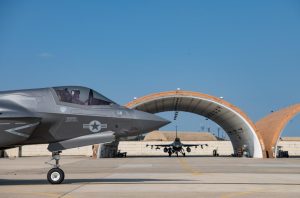Korea Central News Agency (KCNA), one of North Korea’s main state-controlled media, published a statement from a spokesperson for the North’s Foreign Ministry on Monday, criticizing South Korea-U.S. joint air drills.
The ongoing exercises, called Vigilant Storm, will incorporate about 240 warplanes, including F-35 stealth fighters from South Korea and the United States. The exercises kicked off on Monday and will run until Friday.
North Korea called Vigilant Storm “the largest-ever U.S.-South Korea joint air drill.”
“This drill involving more than hundreds of fighters of different missions such as F-35Bs based in Japan is a war drill for aggression mainly aimed at striking the strategic targets of the DPRK in case of contingency in the Korean Peninsula,” the spokesperson said in the statement. (DPRK is an acronym of North Korea’s official name: Democratic People’s Republic of Korea.)
The spokesperson also said that North Korea “is ready to take all necessary measures for defending its sovereignty, people’s security and territorial integrity from outside military threats” and will take “more powerful follow-up measures” if the United States “continuously persists in the grave military provocations.”
This week’s Vigilant Storm is the first South Korea-U.S. joint air drill involving U.S. F-35B fighters. South Korea and the United States extended their joint military drills in the wake of the North’s spate of ballistic missile launches this year. Meanwhile, Pyongyang justified its latest launches as a response to previous South Korea-U.S. military exercises.
“The joint military exercises of the U.S. and its vassal forces have the more clear [sic] aggressive nature than any other ones everywhere else of the world in terms of the period, scale, contents and density,” the spokesperson said. He called the drills this year “the chief culprit in destroying peace and security.”
The spokesperson also claimed that “the U.S. nuclear war scenarios against the DPRK has entered the final stage.” He also reiterated Pyongyang’s claim that its military activities are “self-defensive” as “the U.S. is staging such war exercises for aggression” in the region.
While stating that the South Korea-U.S. joint military drills are aiming at “occupying the territory and depth of the opposite party,” the spokesperson again recalled Pyongyang’s claim that “the recent military drills by units of the Korean People’s Army were carried out under the unstable security circumstances created by the U.S. and South Korea.”
South Korean President Yoon Suk-yeol has proposed an “audacious initiative” to entice North Korea to take steps for denuclearization in exchange for economic benefits. However, Kim Yo Jong, the powerful sister of the North’s leader Kim Jong Un, belittled Yoon’s policy, ruling out the possibility of engaging in inter-Korean dialogue until the end of his term in 2027.
Since U.S. President Joe Biden took office in 2021, Washington has consistently urged Pyongyang to return to the negotiating table with Seoul. However, Pyongyang has not responded to their gestures since the failed Hanoi summit in 2019. North Korea made clear that it would only consider renewing the deadlocked nuclear talks if Washington makes concessions first. The desired concessions include lifting the devastating economic sanctions and halting the joint military drills between South Korea and the United States. The U.S. would not make either move before the North takes measures to withdraw its nuclear weapons.
In the 2022 Nuclear Posture Review released by the U.S. Defense Department last week, it clearly stated that the Kim regime would not survive if “any nuclear attack by North Korea against the United States or its allies and partners” is made. As North Korea codified a new law to legitimize the preemptive use of its nuclear weapons under certain conditions in September, South Korea and the United States have been closely coordinating to strengthen their deterrence capabilities against the North’s nuclear and missile threats.
North Korea has responded, however, by upping its aggression. On Monday, the foreign ministry spokesperson warned that the U.S. “must be prepared for paying an equal price for its attempt to use military force against the DPRK.”
“If the U.S. does not want any serious developments not suited to its security interests, it should stop the useless and ineffective war exercises at one. If not, it will have to totally take the blame for all the consequences,” the spokesperson warned.

































